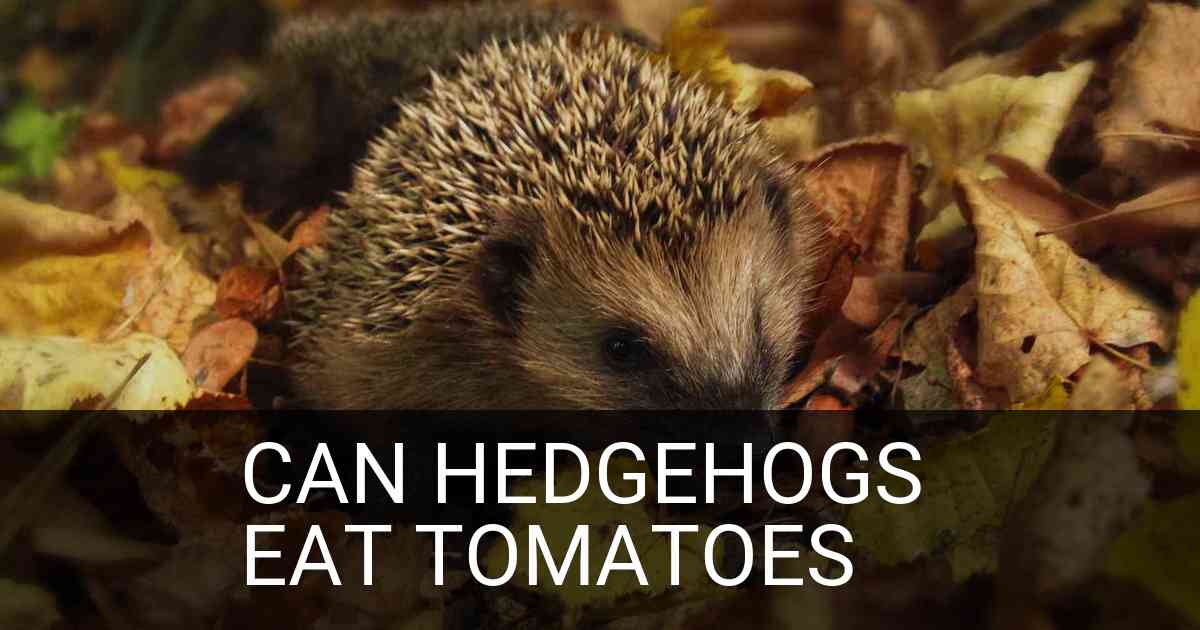
Tomatoes are a popular fruit enjoyed around the world and it’s no surprise that many pet owners want to know if their beloved hedgehogs can eat them. Hedgehogs are omnivorous animals, so they can eat both meat and vegetables, but tomatoes pose some potential risks. This article will explore whether or not tomatoes are safe for hedgehogs to consume and what precautions should be taken when feeding them this juicy treat.
Can Hedgehogs Eat Tomatoes?
Yes, hedgehogs can eat tomatoes in moderation. Tomatoes are a great source of vitamins and minerals such as vitamin C and lycopene, which are beneficial for hedgehog health. However, it is important to note that the tomato plant’s leaves, stems, and vines contain solanine, a naturally occurring toxin that can be toxic to animals when consumed in large amounts. Therefore it is best to feed your hedgehog only the ripe tomato fruit.
Precautions When Feeding Tomatoes
- Only feed your hedgehog ripe tomatoes.
- Avoid giving them too much tomato – limit their intake to 1-2 slices per week.
- Do not feed them any part of the plant other than the ripe fruit (e.g., leaves, stems or vines).
- Make sure they have access to plenty of fresh water after eating tomatoes due to their high acidity content.
The Dangers of Feeding Hedgehogs Unsuitable Foods
Hedgehog food should be designed to meet the specific nutritional needs of hedgehogs. However, it is commonly seen that owners sometimes feed their pet hedgehogs unsuitable foods like dog or cat food, table scraps and other people foods. These foods may contain ingredients that are toxic for hedgehogs such as sugar, salt, fat and artificial additives.
Feeding hedgehogs unsuitable foods can have a number of adverse effects on their health:
- Malnutrition: Unsuitable foods do not provide proper nutrition to hedgehogs and can lead to malnutrition if fed in large amounts.
- Obesity: High-fat snacks or sugary treats often found in some people food can cause weight gain in hedgehogs which can contribute to obesity.
- Diarrhea: Some ingredients present in human food can give rise to gastrointestinal issues such as diarrhea when consumed by a hedgehog.
- Dehydration: Table scraps usually lack moisture content which causes dehydration in animals. This could lead to various health complications if left untreated.
- Toxicity: Certain ingredients like chocolate, onions and garlic are toxic for pets and must be avoided at all costs. Eating these could result in poisoning or even death.
- Dental Issues: Some human snacks like chips are hard enough that they could chip off pieces from the teeth of your pet if chewed on too much. This increases the chances of infection.
The Benefits of Feeding Hedgehogs Vegetables
Hedgehogs are a unique species that can thrive in captivity when the proper care is given. As with any other pet, they require an adequate diet to maintain good health and longevity. One important component of their diet is vegetables, which can provide numerous benefits.
Nutritional Value
Vegetables are an excellent source of vitamins and minerals that hedgehogs need for overall health and well-being. They contain many essential nutrients such as Vitamin A, B vitamins, calcium, magnesium, iron and phosphorus. Eating a variety of vegetables will help ensure your hedgehog receives all the necessary nutrients it needs to stay healthy.
Fiber Content
Vegetables also have high fiber content which helps keep your hedgehog’s digestive system running smoothly. Fiber helps move food through the digestive tract more quickly and efficiently so that it can be properly absorbed by the body. Without enough fiber in its diet, your hedgehog could become constipated or suffer from other gastrointestinal issues.
Variety
In addition to nutritional value, feeding your hedgehog a variety of vegetables can prevent boredom. Offering different types of foods gives them something new to explore every day, keeping them stimulated both mentally and physically. It also ensures they receive a balanced diet since different veggies offer different vitamins and minerals.
Vegetable Suggestions:
-
- Carrots
- Green Beans
- Zucchini
The Benefits of Adding Human Food to a Hedgehog’s Diet
Hedgehogs are cute and entertaining pets, but they require specialized diets that can be difficult to meet. In addition to providing their diet with the necessary nutrients, adding fresh foods from your kitchen can help keep your pet hedgehog’s diet interesting and help them stay healthy.
Vitamins & Minerals
By adding human food to a hedgehog’s diet you can provide additional vitamins and minerals that would not be found in their normal commercial feed. Foods such as carrots, apples, and cooked egg yolks are all excellent sources of essential vitamins and minerals. These additional vitamins and minerals will help ensure your hedgehog is getting the balanced nutrition they need.
Variety & Stimulation
Adding variety to a hedgehog’s diet through human food also provides mental stimulation for them. Fresh fruits and vegetables offer an enticing smell and taste which helps keep them interested in their meals. This stimulates their mind as well as encourages them to eat properly.
Healthy Weight Maintenance
Finally, by introducing more fresh fruits and vegetables into your hedgehog’s diet you can help maintain a healthy weight for them. Many commercial feeds contain high levels of fat which leads to obesity if overfed.
By supplementing with low-calorie snacks like strawberries or watermelon you are able to make sure they are eating enough while avoiding unhealthy weight gain.
Some Healthy Snack Ideas
- Fruits: Strawberries, blueberries, melon slices
- Vegetables: Carrots (cooked or raw), peas (cooked), spinach leaves
- Protein Sources : Cooked eggs (yolk only), mealworms, crickets
Conclusion
In conclusion, tomatoes can be a safe and healthy food for hedgehogs to eat. However, it is important to remember that they are acidic and should not make up the bulk of their diet. There are also some varieties of tomatoes that should be avoided due to their high acidity levels. When feeding your hedgehog tomato, always make sure it has been thoroughly washed and is ripe enough to eat without any extra sugar or salt added. Additionally, ensure you feed them in moderation as too much could cause gastrointestinal upset.

